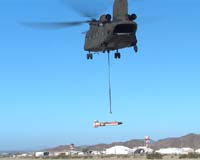| . |  |
. |
Sao Paulo (AFP) April 02, 2010 Brazil plans to announce in early April the winner of a multi-billion-dollar competition for modern fighter jets meant to cement its new role as Latin America's preeminent military power. The tender, though, has been marked by infighting between Brazil's air force and government, and fierce rivalry between the three nations vying to score the deal. The finalists now comprise France's Rafale made by Dassault, Sweden's Gripen NG by Saab, and the F/A-18 Super Hornet by US giant Boeing. President Luiz Inacio Lula da Silva's stated preference for the ultra-sophisticated, semi-stealth Rafale jet annoyed the air force, which preferred the much cheaper and easier-to-maintain Gripen. The Super Hornet, in contrast, has languished in the race -- less because of performance comparisons than Brazil's hard-learned lessons that US companies are more reluctant to give full access to their military technology. Throughout the competition, Lula and his defense minister, Nelson Jobim, have underscored technology transfer as their top priority so that Brazil could not only build its own next-generation fighters but also export them. That ambition derives from Brazil's growing global clout, and the expectation that Latin America's biggest economy now deserves a seat at the top table alongside UN Security Council permanent members Britain, China, France, Russia and the United States. France's jet bid was bolstered by the fact that Brazil's strategic pact with Paris that has already seen it sign a 12-billion-dollar deal in early 2009 to buy 50 helicopters and five submarines from France. One of the submarines will be built to run on nuclear power. The value of the jet fighter contract has not been revealed, but it is estimated at between four billion and 10 billion dollars, depending on the final choice, maintenance costs and armaments. The initial purchase will be for 36 aircraft to patrol Brazil's vast airspace over the next 30 years, with an option to add nearly 100 more. Faced with such a juicy opportunity and eyeing other open tenders in India and Kuwait, the competing companies have gone all out to land the Brazilian tender. French President Nicolas Sarkozy lent his negotiating skills to the endeavor, and he and President Lula issued a joint statement last September saying Brazil had entered into exclusive negotiations to buy the Rafales. But when the two sidelined contenders cried foul and Brazil's air force showed its displeasure through leaks to the media, Lula had to backtrack and say the competition was still wide open. The United States used the opening to send top envoys, including national security adviser Jim Jones, to try to convince Brazil the US government was ready to transfer "necessary" technology to win the deal. Not be outdone, Dassault reportedly cut two billion dollars off its asking price, according to the Folha de Sao Paulo daily. The French company did not confirm the discount, saying only it was "confidently" awaiting Brazil's decision. Then in late February, the USS Carl Vinson aircraft carrier was morphed into a floating showroom when it was sent to Brazil with its contingent of F/A-18s on display. Boeing representatives were handily available on land to answer questions. US Secretary of State Hillary Clinton followed up with a visit in early March during which she also lobbied for the US jet. Sweden's Saab, which has emphasized that Brazil could be a partner in the Gripen NG's development right from the prototype stage, has sought to have the last word. Swedish King Carl XVI Gustaf and Queen Silvia made visit to Brazil this week, during which Swedish business leaders -- including Saab CEO Aake Svensson -- talked up the business opportunities from a Gripen win. Under such formidable pressure -- both domestic and international -- Brazil's government has repeatedly pushed back its decision date. The head of the air force, General Juniti Saito, had said the winner would be announced by the end of March. But Jobim, the defense minister, said Thursday that the victor would now not be declared before April 5, after Brazil's Easter break.
Share This Article With Planet Earth
Related Links The Military Industrial Complex at SpaceWar.com Learn about the Superpowers of the 21st Century at SpaceWar.com
 Australia inks deal for CH-47F helicopters
Australia inks deal for CH-47F helicoptersCanberra, Australia (UPI) Mar 26, 2009 Australia has signed a $467 million contract with the U.S. Army Security Assistance Command to buy seven CH-47F Chinook helicopters, two simulators and associated spares. The Defense Materiel Organization, the procurement arm of the Australian military, signed the deal for the aircraft that will replace six Boeing CH-47D Chinooks. The helicopters are operated by C Squadron of the 5th Av ... read more |
|
| The content herein, unless otherwise known to be public domain, are Copyright 1995-2010 - SpaceDaily. AFP and UPI Wire Stories are copyright Agence France-Presse and United Press International. ESA Portal Reports are copyright European Space Agency. All NASA sourced material is public domain. Additional copyrights may apply in whole or part to other bona fide parties. Advertising does not imply endorsement,agreement or approval of any opinions, statements or information provided by SpaceDaily on any Web page published or hosted by SpaceDaily. Privacy Statement |